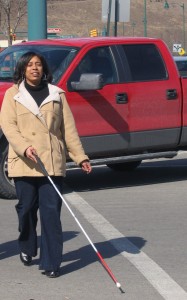When Schrika Hill writes her original rap lyrics, she doesn’t use an ink pen and paper, or even a computer. She composes her lyrical street poetry on Braillewriter, a machine that produces a series of dots that represent the letters of the alphabet.
 They’re the only letters Schrika can ‘see.’
They’re the only letters Schrika can ‘see.’
Schrika lost her vision when she was 22 to retinitis pigmentosa, an inherited disorder that causes a progressive loss of vision, usually ending in blindness. She had just graduated with an associate’s degree in business management and accounting and failed a driver’s license vision test. A doctor confirmed that she was going blind.
After suffering deep depression and being struck by a car she didn’t see, Schrika came to Blind & Vision Rehabilitation Services of Pittsburgh.
“I wasn’t sure I wanted to go to BVRS,” she said. “I didn’t know what could be done for me. After all, they couldn’t give me my vision back. But the minute I arrived, I was nonstop learning.”
In Personal Adjustment to Blindness Training, Schrika learned safe cooking including how to turn on a stove, listen to a recipe on a tape recorder, and how to make a variety of meals and snacks so she could cook for her husband, Turk, again.
In orientation and mobility, she learned to use a long cane and how to take a bus to get to destinations. And in communication class, Martha Burgoon taught her how to use a tape recorder to keep information that she once kept on lists, and she taught her how to use the Braille writer.
“When I left BVRS, I had the skills, confidence and independence I needed to continue to live my life.”
Rather than return to business management, Schrika embarked on a new career. Singing, she said, is in her roots.
While Schrika knows how to use a computer, she prefers writing lyrics on the Braille writer because she can take the pages with her and read through her fingertips if she forgets any of the lyrics in the recording studio.
Today she mesmerizes audiences with her original stirring lyrics and a commanding stage presence that are all the more poignant because she cannot see the people she is singing to, being able to only distinguish between light and dark.
Schrika assesses her vision loss through the filter of her characteristic optimism. “I have nothing to complain about,” she said. “I hope people will see in me that obstacles can be overcome. I want to reach out to folks who are dealing with things much greater than I am to let them know that life does not have to stop just because of disabilities or troubles or problems. No matter what you are faced with, inside we all have the courage to overcome.”
Schrika was introduced to music through grandparents, Nancy E. Greene-Brown and Robert J Brown Jr., who everyone knew as Big June. Schrika grew up listening to a variety of artist including Marvin Gay, R & B, Funk, and her grandmother’s favorite of all, the music of Patti LaBelle.
“Some of my favorite memories are when I spent the weekend and people would drop in out of the blue, or relatives would come in from out of town and the party would begin!” Schrika said. “Some people had shelves of albums, but that was not the case with my Grandmother. She had crates of albums and I knew every song, title, and artists in those crates.”
“At the age of three, I started entertaining family members, friends, and neighbors anybody I could,” she said. “In the beginning it was for attention, then it turned into something that I enjoyed, because whether it was singing, dancing, or at a track meet I would put my heart into it. You wouldn’t believe how many grown up songs I knew, even though I didn’t know what I was singing about!”
Today, as an energetic and passionate performer, Schrika moves the audience through a joyful journey that wraps them in emotions and stirs their senses. “When I perform, I feel phenomenally free, and I want the audience to feel that way too,” she said.
“Music is a big part of me,” Schrika said. “And when I sing, people see me and not the cane, not the vision impairment. They see and hear 100 percent of what is inside of me from the top of my head to the bottom of my feet and that is the music that is in my soul.”


